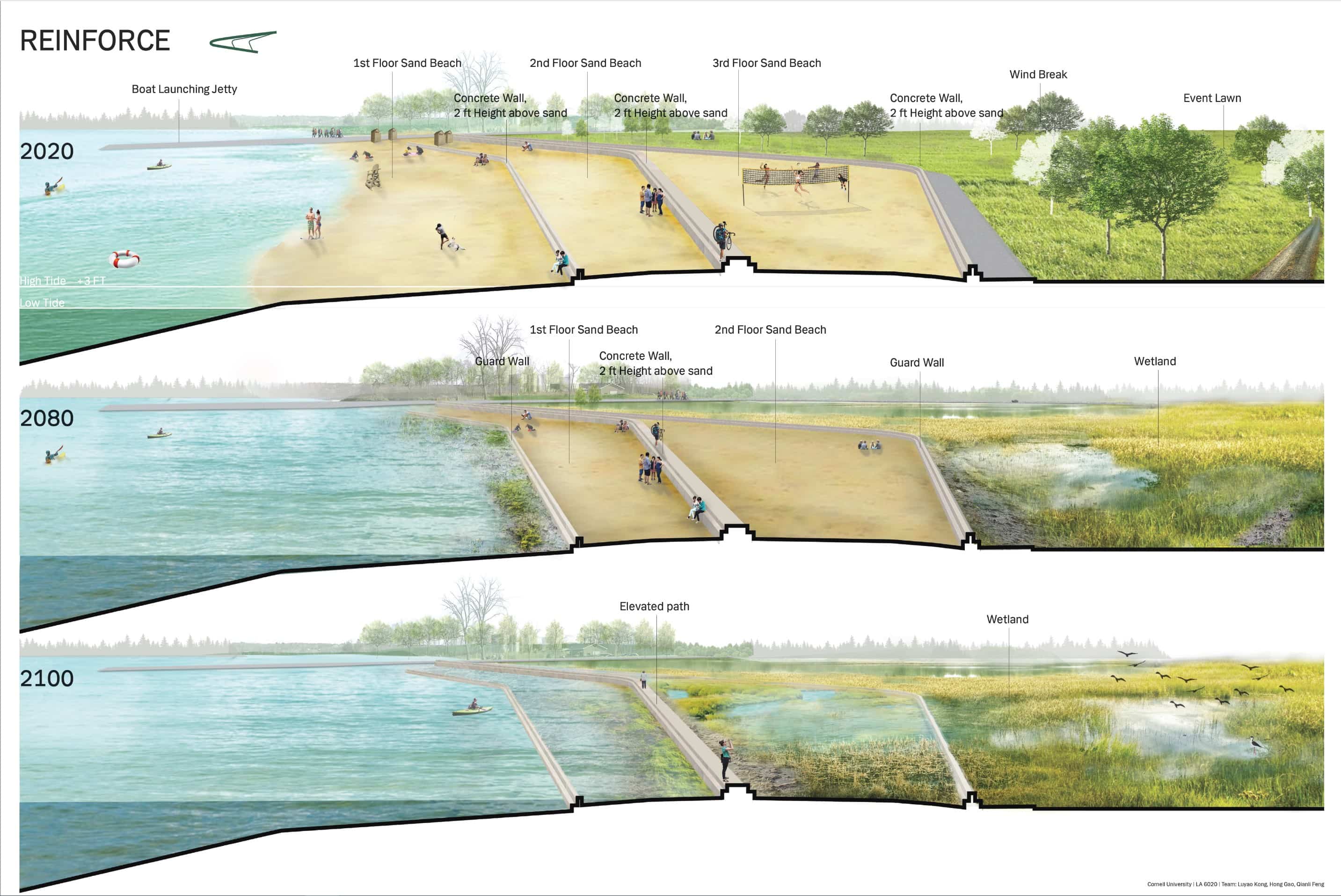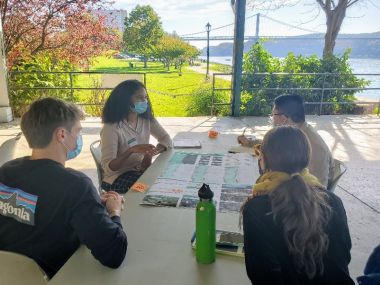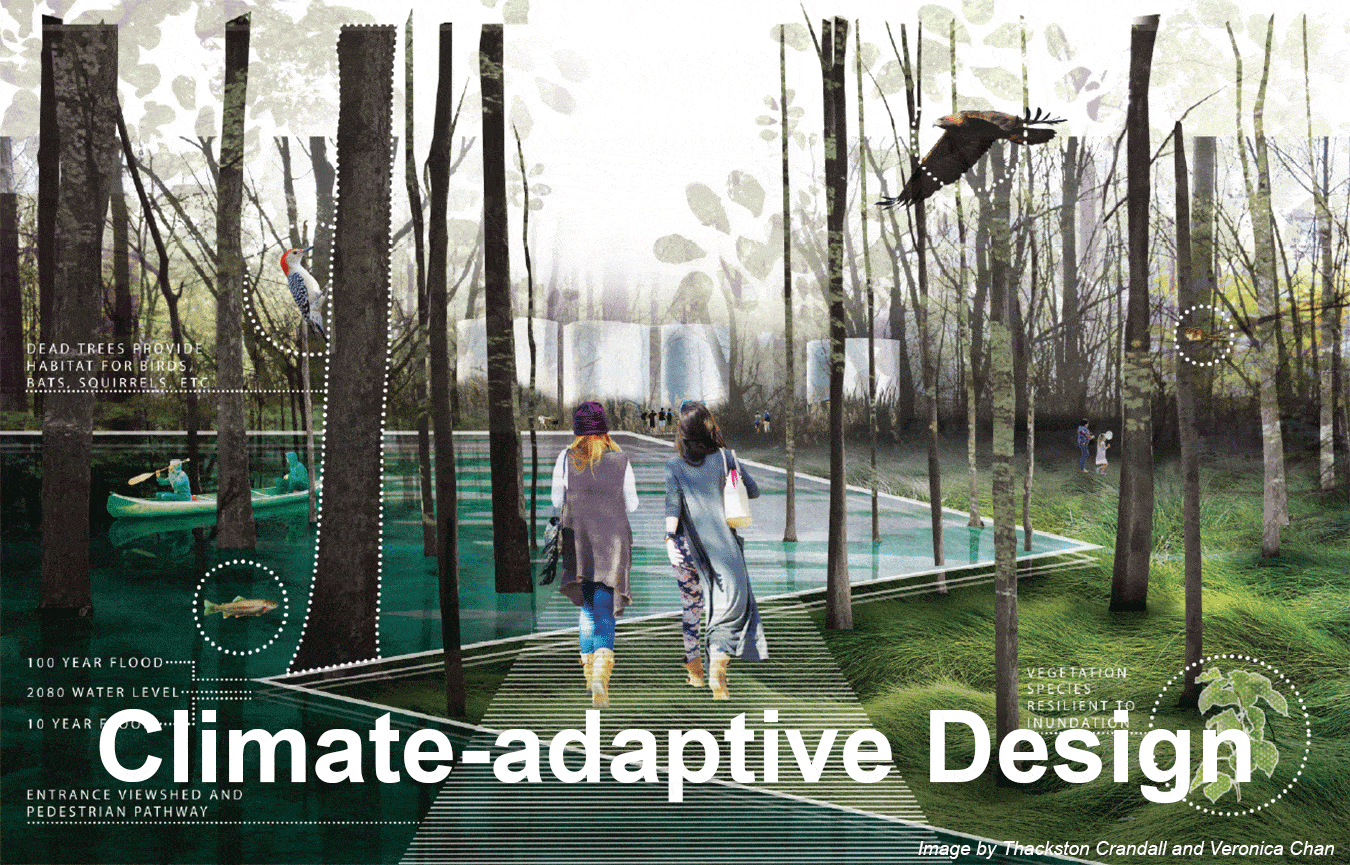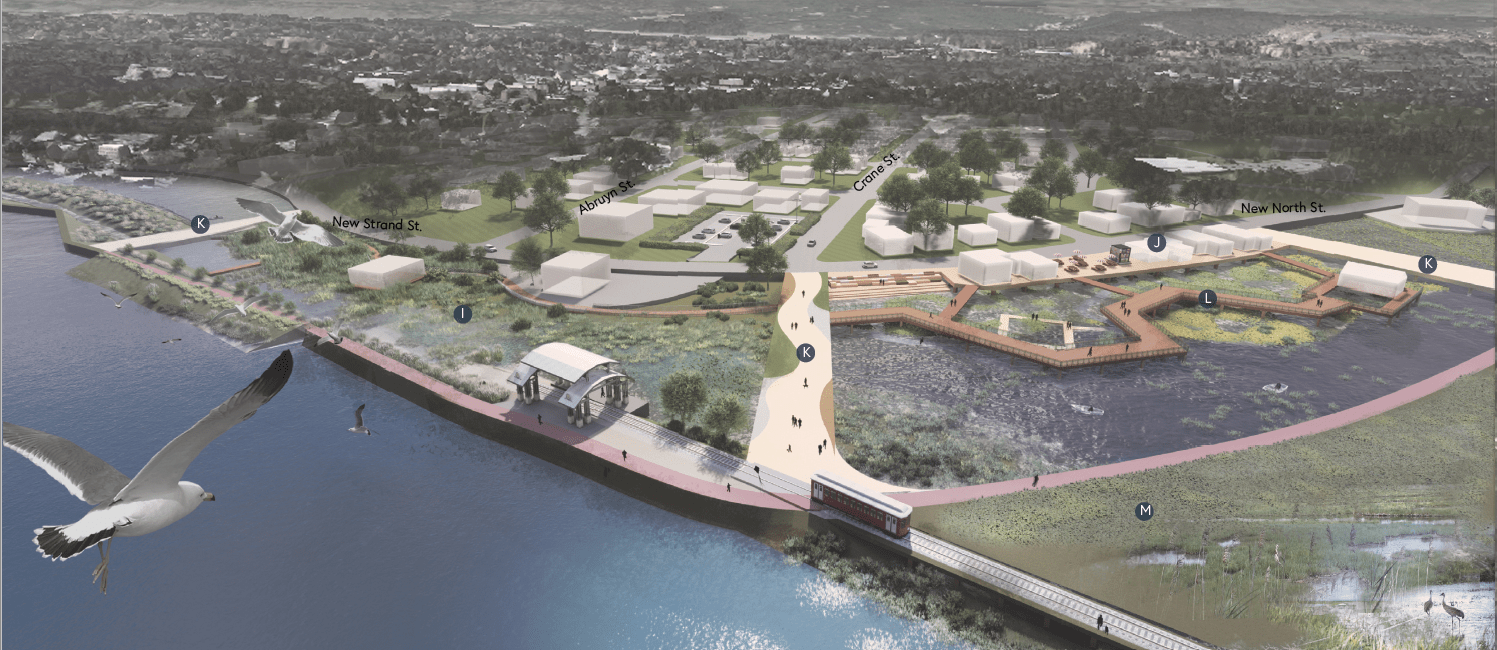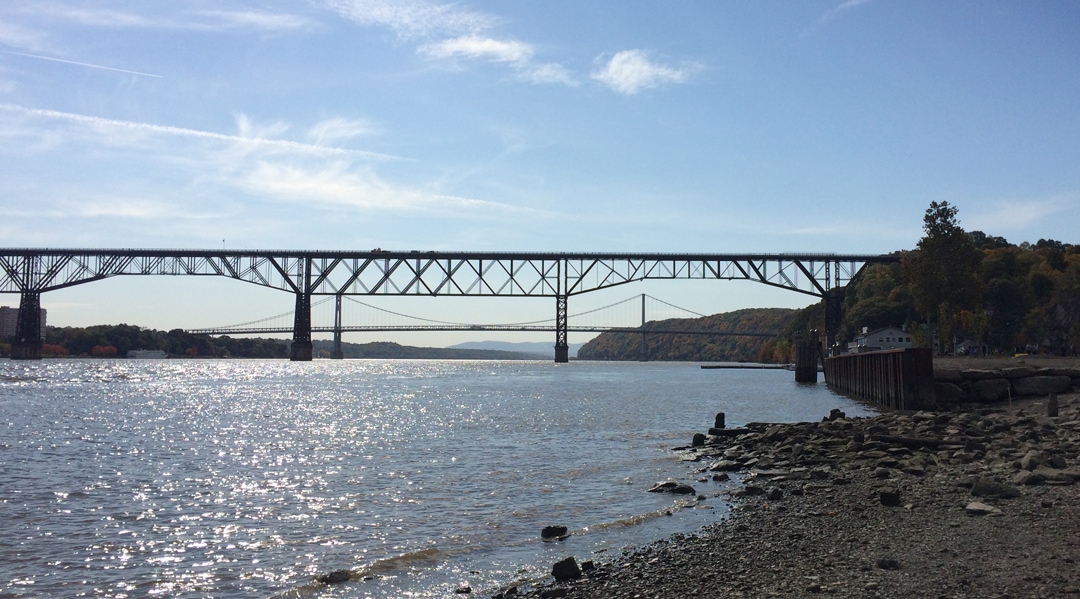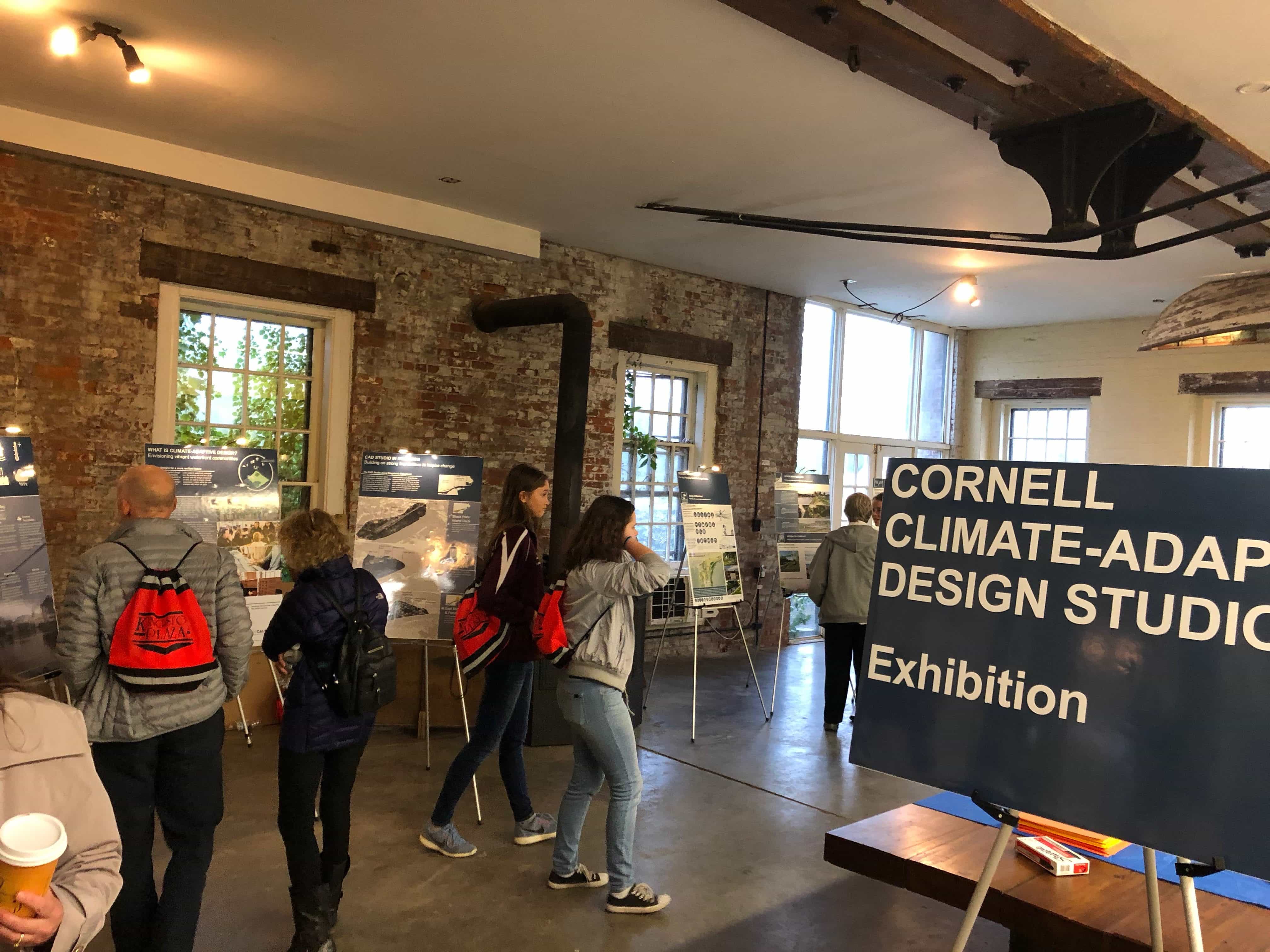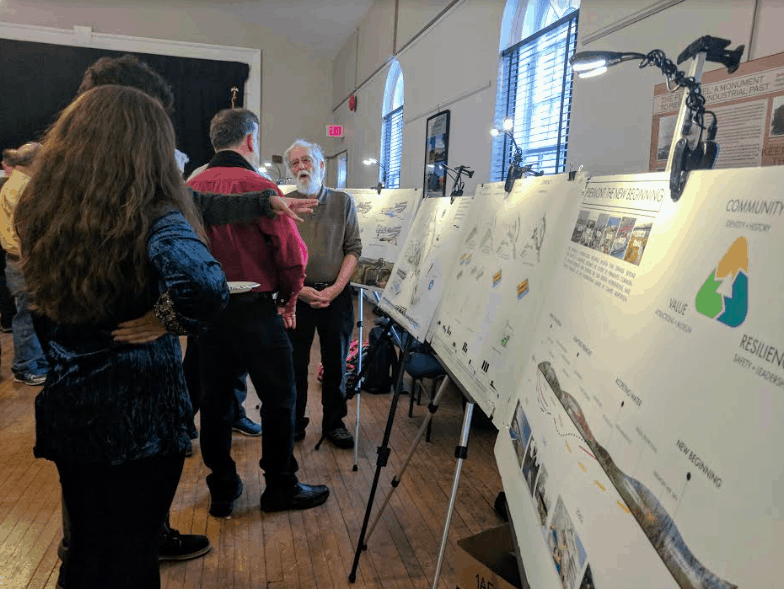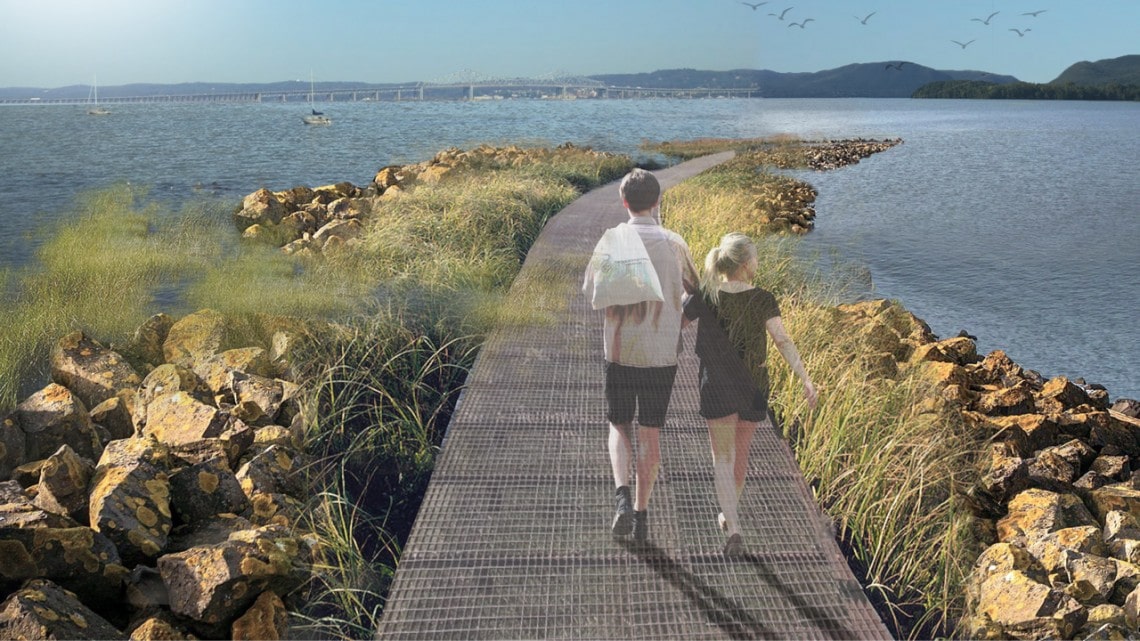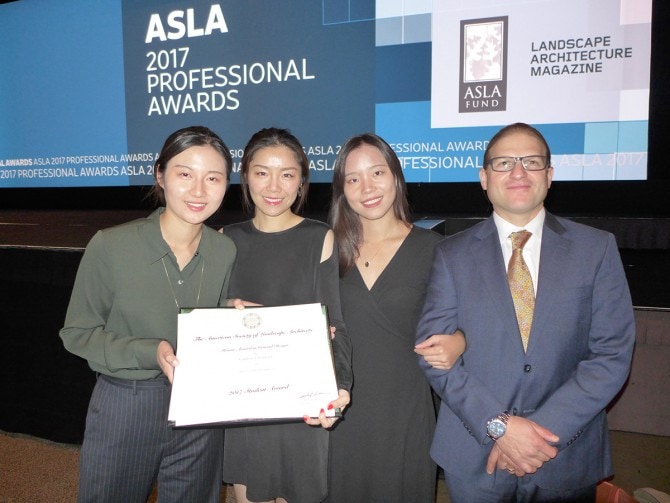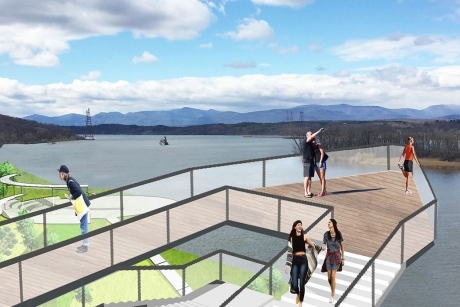News
Village of Tarrytown to Serve as Host Community for Cornell University 2022 Climate-adaptive Design Studio |
July 2022
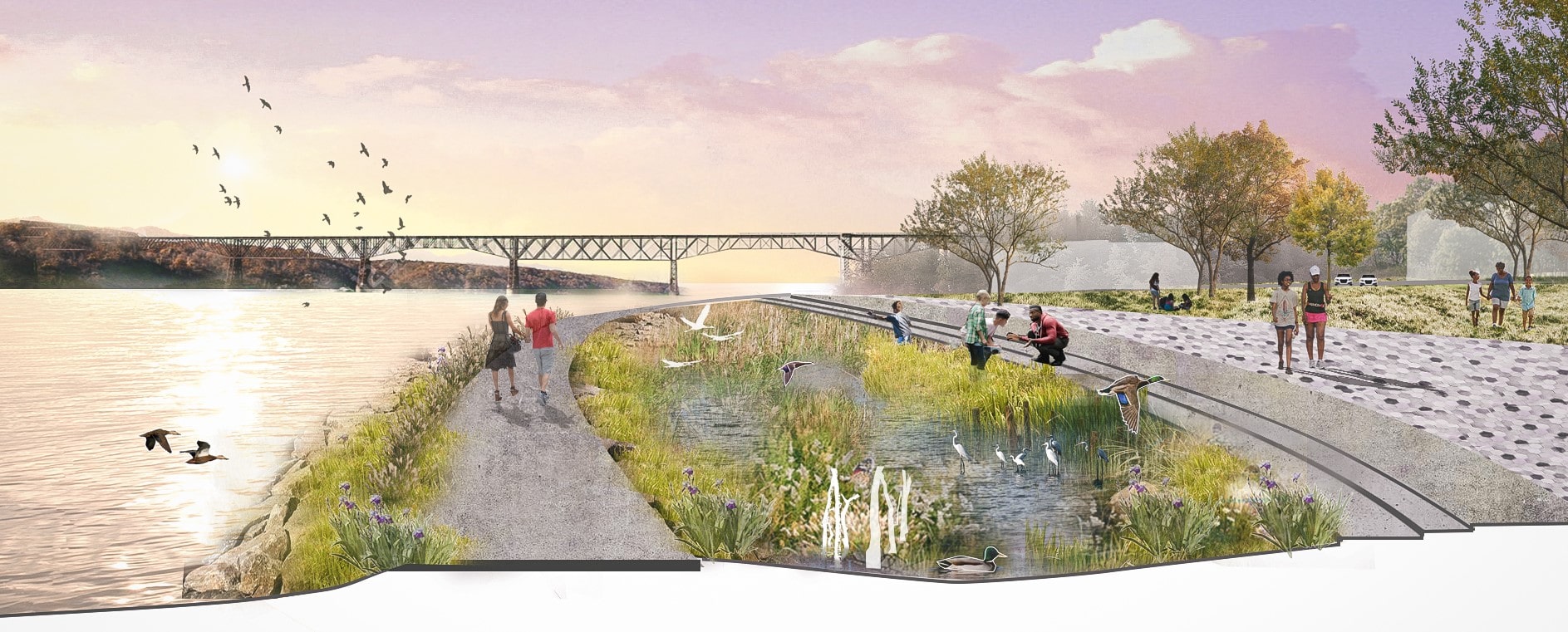
(Drawing by Xinyue Hope Shen MLA’22
The Climate-adaptive Design (CaD) Studio is a program led by Professor Josh Cerra, Cornell University Landscape Architecture Department, in partnership with the NYSDEC Hudson River Estuary Program. The CaD Studio is the first step in a three-phase process to inspire, advance, and implement climate adaptation and resiliency projects in Hudson Riverfront communities.
The CaD Studio links Cornell University graduate students in landscape architecture with high flood-risk Hudson Riverfront communities. Together, they explore design alternatives for more climate-resilient and connected waterfront areas. Community stakeholders are engaged throughout the studio to help inform the design process and support more usable results for the municipality that the student design teams are partnered with.
- Watch a 5-minute video on the CaD Studio
- Visit our webpage on the CaD Studio
- View our Storymap from 2021 Poughkeepsie Studio
View concept designs from previous CaD studios
https://www.futureofsmallcities.org/events/hudson-river-resilience
(Drawing by Hong Gao MLA’21, Luyao Kong MLA’20, and Qianli Feng MLA’20)
After decades of industrialization, pollution, and neglect, communities up and down the Hudson River are transforming their waterfronts into useable, ecologically sensitive spaces. This transformation also raises a host of questions: Should these waterfronts be turned into greenspace for all? How can a shoreline both be economically viable but also adaptive to rising tides? How might we envision the restoration of our waterfronts as part of a region-wide comprehensive plan?
https://news.cornell.edu/stories/2022/03/facing-high-water-hudson-towns-reimagine-waterfronts
(Drawing by Lingyi Xu, MLA’20)
The banks of the Hudson River shore at Ossining, New York, may seem tranquil now, but the Westchester County town – and other villages along the river – face a watery future: Due to projected climate change effects, the Hudson is rising.
Cornell graduate students studying landscape architecture examined Ossining last fall, and in mid-December presented the town and village with ideas for climate-change adaptation. The student projects included marrying the built environment with marshy wetlands, plugging in more recreation, and working in tandem with natural and environmental systems.
“Students are a central part of this work,” said Josh Cerra, associate professor in landscape architecture, who teaches the climate-adaptive design studio course. “The students’ design explorations and research move ideas forward for communities.”
New York State Department of Environmental Conservation (DEC) Commissioner Basil Seggos today announced an opportunity for Hudson Riverfront municipalities to host the Cornell University Department of Landscape Architecture’s Climate-adaptive Design (CaD) Studio this fall. The CaD Studio links Cornell University students in landscape architecture with communities interested in exploring design alternatives for more climate resilient and connected waterfront areas.
“DEC is proud to partner with Cornell University and local experts on the ground to help prepare New York’s waterfront communities for the challenges that go hand-in-hand with our changing climate,” said Commissioner Seggos. “The Climate-adaptive Design Studio opportunity announced today supports New York State’s ongoing efforts to boost and improve community readiness for the threats posed by extreme weather events and sea-level rise on the tidal Hudson River and is an example of the all-hands-on-deck approach required to meeting the climate challenge head on…”
Brian Rahm, Director of the New York State Water Resources Institute at Cornell University said, “The design studio, one part of a long-term partnership between DEC, Cornell University and Hudson Valley communities, is the creative force driving conversation about inspiring and practical climate change adaptation opportunities.”
In 2021, DEC awarded $250,000 grants to the town and village of Ossining and the city of Hudson, previous CaD Studio host communities, to advance the design and implementation of CaD-inspired projects on their riverfronts.
Interested municipalities can learn more about the Climate-adaptive Design Process (leaves DEC’s website) by visiting the Cornell CALS website. An informational webinar about the CaD Studio opportunity will be held on April 5 from 1:30 p.m. to 3 p.m. Register for the webinar (leaves DEC’s website). Interested participants must submit a letter of interest to Lyndsey Cooper, Hudson River Estuary Program Climate Outreach Specialist, via email at Lyndsey.Cooper@dec.ny.gov by 5 p.m. on Monday, May 2, 2022. Visit the Cornell CALS website for instructions on submitting a letter of interest (leaves DEC’s website).
New York State Department of Environmental Conservation (DEC) Commissioner Basil Seggos today announced more than $349,000 in awards for three projects to help communities improve climate resiliency, mitigate local flooding, and restore stream habitats. Funding for these projects is provided by the State’s Environmental Protection Fund (EPF) and is administered by DEC’s Hudson River Estuary Program in partnership with NEIWPCC. The announcement was made as New York State prepares to commemorate Climate Week 2021.
“The funding awards announced today will help Hudson River communities in Columbia, Dutchess, and Westchester counties bolster their climate resilience by enhancing the ability of natural systems to reduce flood risks,” said DEC Commissioner Seggos. “While Hudson Valley cities, towns, and villages continue to recover after devastating flooding in the wake of Tropical Depression Ida, New York is investing in our communities to preserve our natural resources and strengthen their ability to withstand flooding.”
Two Climate-Adaptive Design Phase II Projects Totaling $250,000.
Ossining Shoreline Revitalization and Community Connectivity Improvements: This $125,000 contract was awarded to Henningson, Durham and Richardson Architecture and Engineering, P.C. (HDR) for a living shoreline project at the Henry Gourdine and Louis Engel Waterfront Parks in Ossining. An inclusive stakeholder engagement process will be used to provide input on specific design elements and eco-friendly elements will be included in the shoreline stabilization to create fish habitat and promote recreational fishing opportunities. The project will result in an implementable preliminary design and an engineering report that includes a permitting strategy.
City of Hudson Climate-Adaptive Design: This $125,000 contract was awarded to Hudson Valley Collaborative for a project in the city of Hudson that will use a nature-based approach to protecting shoreline and tidal wetlands from sea-level rise, while maintaining active recreation and cultural activities. Hudson Valley Collaborative will engage a diverse group of stakeholders to seek community consensus on the design, which will prioritize ecological solutions that restore the intertidal marshland, as well as the access points for public boat docks and launches that give the Hudson waterfront its recreational vitality. The final preliminary design will provide the necessary design, engineering, and permitting documentation for the city to finalize and construct the design.
(Drawing by Jihany Hassun MLA’20)
The Hudson River is tidal, gaining a mean elevation of only two feet for 150-plus miles inland from the Atlantic. It is flanked, almost without interruption, by bluffs and cliffs. Most communities along it have only a slender strip of land at river level. Historically, industries and infrastructure were sited below, with more salubrious parts of towns built up the
slopes. Most industry is gone. Communities want to reinvent their riverfronts, which means contending with the tides and storms of a changing climate.
They’re getting help from Josh Cerra, ASLA, the director of graduate studies in the Department of Landscape Architecture at Cornell University. With collaboration from the New York State Department of Environmental Conservation’s Hudson
River Estuary Program, he has been bringing community-based “Climate-Adaptive Design” studios to Hudson River towns.
(Drawing by Lingyi Xu, MLA’20)
The 2020 WLA Awards received over 230 entries from across the world including the USA, China, Australia, Singapore, Belgium, India, Thailand, Malaysia, Netherlands and many more. The range of entries for this year’s awards showcase a highly developed landscape architecture profession whose work is ever-increasingly providing well thought out relevant solutions for communities, cities and countries.
As with previous years, the 2020 jury found it hard to shortlist each category due to the high quality of the projects and submissions. WLA is proud to announce the following entries have been shortlisted in each category (alphabetical order):
(Drawing by Lingyi Xu, MLA’20)
The banks of the Hudson River shore at Ossining, New York, may seem tranquil now, but the Westchester County town – and other villages along the river – face a watery future: Due to projected climate change effects, the Hudson is rising.
Cornell graduate students studying landscape architecture examined Ossining last fall, and in mid-December presented the town and village with ideas for climate-change adaptation. The student projects included marrying the built environment with marshy wetlands, plugging in more recreation, and working in tandem with natural and environmental systems.
“Students are a central part of this work,” said Josh Cerra, associate professor in landscape architecture, who teaches the climate-adaptive design studio course. “The students’ design explorations and research move ideas forward for communities.”
DEC Announces $250,000 in Awards for Climate-adaptive Design studio municipal partners
June 2019
(Image by Thackston Crandall MLA’18 and Veronica Chan MLA’18, 2018 LA6020 Cornell Climate-adaptive Design Studio)
The New York State Department of Environmental Conservation’s (DEC) Hudson River Estuary Program, in partnership with the New England Interstate Water Pollution Control Commission (NEIWPCC), today awarded contracts to create design and engineering plans for climate resilient and connected waterfront places in the city of Kingston and village of Piermont. Each of these communities participated in the Climate-Adaptive Design Studio, a program that links Cornell University graduate and undergraduate students in landscape architecture with flood-prone Hudson Riverfront communities to create design concepts that incorporate projections for sea-level rise and extreme weather. The designs encourage water-dependent use of shoreline property, provide public access to waterfronts, and use nature-based solutions for stormwater management and shoreline stability.
“The grant awards announced today will help these Hudson River communities bolster their resilience by designing innovative projects that maintain and enhance the ability of natural systems to reduce flood-risk and storm surge,” DEC Commissioner Basil Seggos said. “In the face of increasing flood risks and severe weather events, New York State is investing in our communities to preserve our natural resources and strengthen their ability to withstand flooding.”
DEC Announces Fall 2019 Opportunity for a Hudson Municipality to Host the Climate-adaptive Design Studio
May 2019
(Image by Thackston Crandall MLA’18 and Veronica Chan MLA’18, 2018 LA6020 Cornell Climate-adaptive Design Studio)
New York State Department of Environmental Conservation (DEC) Commissioner Basil Seggos: “This unique opportunity will help waterfront communities along the Hudson River bolster their resilience by designing innovative projects like floodable parks and flood-adapted buildings. To prepare New York’s waterfront communities for the challenges of our changing climate, DEC is partnering with design experts from Cornell and local experts on the ground to ready New Yorkers for the challenges posed by extreme weather events and sea-level rise on the tidal Hudson.”
(Image by Xining Wan MLA’19 and Lixuan Li MLA’19, 2018 LA6020 Cornell Climate-adaptive Design Studio)
.The RFP seeks climate-adaptive design project development proposals from design firms, supported by a municipality that has worked with the Climate-adaptive Design studio
(Photo by Libby Zemaitis)
Cerra’s Climate adaptive Design studio has been referenced in an RFP from NYS Department of Environmental Conservation, indicative of the potential for the Climate-adaptive Design studio to influence thinking about design and implementation of actual adaptation projects in New York State
(Photo by Josh Cerra)
The studio links landscape architecture students with flood-risk Hudson Riverfront communities to explore design alternatives for more climate resilient, beautiful and connected waterfront areas.
(Photo by Libby Zematis)
The studio links landscape architecture students with flood-risk Hudson Riverfront communities to explore design alternatives for more climate resilient, beautiful and connected waterfront areas.
Village resident Klaus Jacobs, a research geologist at Columbia University, said the students’ work comes at a pivotal point: “Without those visions to get projects started, this would be basically impossible. This is a very crucial step in a long process that would be much harder if we hadn’t had [these ideas] from Cornell.”
Graduate students Hong Gao, Luyao Kong and Qianli Feng received the prestigious award for Weaving the Waterfront, a design that combines climate-resilient programs and public spaces. The ASLA Awards recognize top work of landscape architecture students around the world.
(Photo by Libby Zematis)
Cornell’s approach to conservation in the Hudson watershed has been to work with communities on their own terms and at their own pace. […] The approach has paid off in myriad ways. Of the 260 municipalities in the Hudson’s watershed, roughly half have partnered with Cornell…
To keep riverfront communities intact in the face of rising waters due to climate change, landscape architecture master’s students at Cornell’s Climate-Adaptive Design (CAD) studio are sketching sturdy, flexible concepts for a city along New York’s Hudson River while factoring in the tide’s swell.
